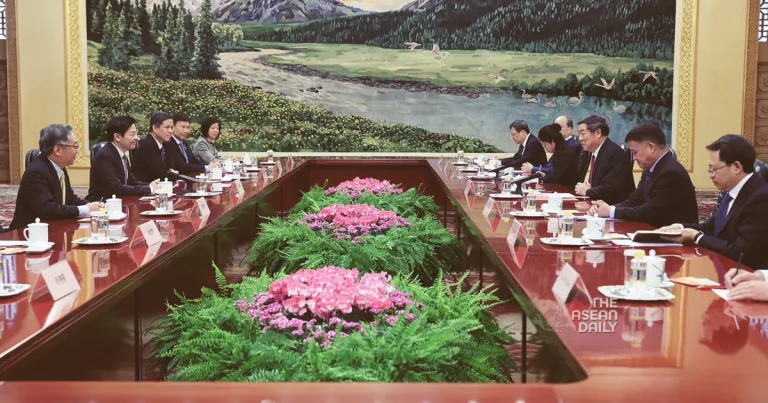7-12-2023 (BEIJING) Singapore and China have announced the signing of an upgraded free trade agreement, providing Singaporean businesses with enhanced access to China’s markets. The agreement was unveiled during the 19th Joint Council for Bilateral Cooperation (JCBC) meeting held in Tianjin, where a total of 24 agreements and memorandums of understanding (MOUs) were signed between the two countries. This marks an increase from the 19 agreements signed last year and represents the largest number of agreements in recent years. The agreements span various sectors, including sustainability, education, trade, food security, and healthcare.
The JCBC meeting, co-chaired by Singapore’s Deputy Prime Minister Lawrence Wong and Chinese Vice Premier Ding Xuexiang, serves as the highest-level annual forum between the two nations. It serves to review the progress of bilateral collaboration and set the direction for future cooperation.
During his opening remarks at the JCBC meeting, Vice Premier Ding expressed satisfaction with the earlier bilateral meeting between the Chinese delegation and the Singaporean delegation, which included several ministers. He emphasized the importance of the meeting in establishing a new landscape for mutually beneficial cooperation between China and Singapore, highlighting the three key words that define their relations: all-round, high quality, and future-oriented.
Deputy Prime Minister Lawrence Wong, who is currently on a four-day trip to Beijing and Tianjin, expressed his delight at attending the first in-person JCBC meeting since the outbreak of the COVID-19 pandemic. He also commended the successful development of the Sino-Singapore Tianjin Eco-City, which celebrates its 15th anniversary this year. Wong described the eco-city as a visionary project that has transformed a once barren wasteland into a sustainable and beautiful city through joint efforts and cooperation.
Among the agreements announced at the meeting is a new 30-day mutual visa-free travel arrangement between Singapore and China, expected to be implemented in early 2024. The Prime Minister’s Office (PMO) of Singapore stated that both Vice Premier Ding and Deputy Prime Minister Wong recognized the impact of global geopolitical tensions, climate change, and the digital revolution on people’s lives and livelihoods. They affirmed the importance of promoting greater people and business flows between the two countries and exploring collaborations to enhance connectivity, including cross-border financial connectivity.
In addition to the JCBC meeting, Deputy Prime Minister Wong and Vice Premier Ding also co-chaired the 24th China-Singapore Suzhou Industrial Park Joint Steering Council (JSC), the 15th Sino-Singapore Tianjin Eco-City JSC, and the 7th China-Singapore (Chongqing) Demonstration Initiative on Strategic Cooperation JSC. These joint steering councils review the progress and discuss further cooperation on the three flagship government-to-government projects.
The upgraded free trade agreement, known as the China-Singapore Free Trade Agreement (CSFTA) Further Upgrade Protocol, will provide Singapore with greater market access to China’s services sectors. Singapore investors will experience fewer restrictions in 22 sectors, including construction, retail and wholesale, and architectural and urban planning services. The protocol also establishes a new services chapter to facilitate clearer rules and enhanced transparency for telecommunications regulatory processes, as well as encourage industry collaboration for innovation and development.
The CSFTA Further Upgrade Protocol was signed by Singapore’s Minister for Trade and Industry Gan Kim Yong and China’s Minister of Commerce Wang Wentao. Minister Gan expressed his hope that businesses will leverage this enhanced agreement to seize opportunities in China, emphasizing the importance of further cooperation in areas of mutual interest.
The upgraded CSFTA, China’s first comprehensive bilateral free trade agreement with an Asian country, came into force in 2009. Since its upgrade in 2019, bilateral trade and investments have experienced an average annual growth of 7% and 7.7% respectively. Negotiations for this latest upgrade began at the 16th JCBC meeting in 2020 and concluded last month.
In addition to the trade agreement, Singapore’s Monetary Authority and China’s People’s Bank have initiated a pilot program allowing tourists from both countries to use digital yuan, or e-CNY, for transactions in Singapore and China. This initiative stems from the memorandum of understanding on digital finance cooperation signed in 2020. The use of e-CNY for tourism spending aims to enhance convenience for travelers during their overseas trips.
The JCBC meeting also addressed other digital finance and capital markets initiatives, including the launch of an exchange-traded funds product link between the Singapore Exchange and the Shanghai Stock Exchange. This collaboration aims to foster greater opportunities for fund managers in both markets and improve investors’ access to exchange-traded funds products.
Furthermore, Singapore’s local banks and China’s UnionPay International have entered into early-stage feasibility discussions regarding a potential remittance linkage between Singapore’s PayNow function and China’s UnionPay. This linkage, if established, could facilitate secure, convenient, and cost-effective cross-border payments and remittances between the two countries.
Singapore’s Ministry of Communications and Information (MCI) also announced a collaboration between Singapore and China in the area of artificial intelligence (AI). The collaboration will focus on promoting responsible AI innovation and adoption, as well as facilitating AI talent development and exchange between the two countries.
Overall, the upgraded free trade agreement between Singapore and China signals a deepening of economic ties and increased cooperation between the two nations. It provides Singaporean businesses with improved access to China’s markets, particularly in the services sectors, and paves the way for greater collaboration in various areas, including sustainability, education, and healthcare. The signing of multiple agreements and MOUs during the JCBC meeting demonstrates the commitment of both countries to strengthen their bilateral relations and explore new opportunities for mutual benefit.




